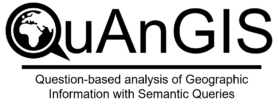Results

Source code and data:
Media:
Peer-reviewed publications:
Nyamsuren, E., Xu, H., Top, E. J., Scheider, S., & Steenbergen, N. (accepted/In press). Semantic complexity of geographic questions: A comparison in terms of conceptual transformations of answers. AGILE2023.
Xu, H., Nyamsuren, E., Scheider, S., & Top, E. (2023). A grammar for interpreting geo-analytical questions as concept transformations. International Journal of Geographical Information Science, 37(2), 276-306. doi: https://doi.org/10.1080/13658816.2022.2077947 [pdf]
Top, E., Scheider, S., Xu, H., Nyamsuren, E., & Steenbergen, N. (2022). The semantics of extensive quantities within geographic information. Applied Ontology, 17 (3), 337-364. doi: http://dx.doi.org/10.3233/AO-220268 [pdf]
Xu, H., Nyamsuren, E., & Scheider, S. (2022). Assemble geo-analytical questions through a Blockly-based natural language interface. AGILE: GIScience Series, 3, 69. [pdf]
Nyamsuren, E., Top, E. J., Xu, H., Steenbergen, N., & Scheider, S. (2022). Empirical evidence for concepts of spatial information as cognitive means for interpreting and using maps. In 15th International Conference on Spatial Information Theory (COSIT 2022). Schloss Dagstuhl-Leibniz-Zentrum für Informatik. [pdf]
Scheider, S., & de Jong, T. (2022). A conceptual model for automating spatial network analysis. Transactions in GIS. Transactions in GIS, 26(1), 421-458. [pdf]
Sajjadian, M., & Scheider, S. (2022). Geodata source retrieval by multilingual/semantic query expansion: the Case of Google Translate and WordNet version 3.1. AGILE: GIScience Series, 3, 60. [pdf]
Kruiger, J. F., Kasalica, V., Meerlo, R., Lamprecht, A. L., Nyamsuren, E., & Scheider, S. (2021). Loose programming of GIS workflows with geo‐analytical concepts. Transactions in GIS, 25(1), 424-449. [pdf]
Scheider, S., Nyamsuren, E., Kruiger, J.F. & Xu, H. (2020). Why geographic data science is not a science. Geography Compass, 14(11), e12537. [pdf]
Neuts, B., van der Zee, E., Scheider, S., Nyamsuren, E., & Steenberghen, T. (2020). Topics and Sentiments in Online Place Reviews, an Innovative Way of Understanding the Perception of a City without Asking. In SHAPING URBAN CHANGE–Livable City Regions for the 21st Century. Proceedings of REAL CORP 2020, 25th International Conference on Urban Development, Regional Planning and Information Society (pp. 893-902). CORP–Competence Center of Urban and Regional Planning. [pdf]
Scheider, S., Meerlo, Rogier, Kasalica, V., & Lamprecht, A.L.(2020). Ontology of core concept data types for answering geo-analytical questions. Journal of Spatial Information Science (20). [link]
Scheider, S., Nyamsuren, E., Kruiger, H., & Xu, H. (2020). Geo-analytical question-answering with GIS. International Journal of Digital Earth, 1-14, doi: 10.1080/17538947.2020.1738568. [link]
Xu, H., Hamzei, E., Nyamsuren, E., Winter, S., Tomko, M., & Scheider, S. (in press). Extracting interrogative intents and concepts from geo-analytic questions. Proceedings of the 23rd AGILE conference on Geographic Information Science, Springer. [pdf]
Li, Z., Li, Y., Shekar, S., Hofer, B., Scheider, S., & Gui, Z. (2019). Geospatial information processing and computing technologies. In Huadong Guo, Michael F. Goodchild & Alessandro Annoni (Eds.), Manual of Digital Earth. [link]
Mai, G., Janowicz, K., Yan, B., & Scheider, S. (2019). Deeply integrating linked data with geographic information systems. Transactions in GIS, 23(3), 579-600. [link]
Posters and Presentations:
Scheider, S. (28.09.2021). If GIS provides the answer, what was the question again? Geo-analytical question-answering as a form of knowledge generation. Keynote at GIScience 2021.
Nyamsuren, E., Scheider, S., Xu, H. & Kruiger, J.F. (28.11.2019). Geo-analytic Question Answering: Going Beyond Knowledge Retrieval. 13th Workshop on Geographic Information Retrieval (GIR’19). [slides]
Scheider, S., Kruiger, H., Xu, H., & Nyamsuren, E. (2019). Semantic data type signatures for representing spatial core concepts in GIS operations on spatial layers. Poster presentation at 14th International Conference on Spatial Information Theory (COSIT2019), Regensburg, Germany, September 9-13 2019. [link]
Scheider, S. (2019). Question-answering with linked spatial data: the role of spatial core concepts. Keynote held at SDI.Next: Linked Spatial Data in Europe.
Theses:
van Ark, A. (2022). Cognitive Study: Extensive and Intensive Measures in Statistical Maps. Bachelor thesis. Human Geography, Utrecht University.
Azani, A. (2022). Exploring Behavioural Evidence Of Cognitive Core Concepts In Spatial Analysis. Bachelor thesis. Human Geography, Utrecht University.
Top, E.J. (2021). The Semantics of Extensive Quantities in Geographical Information. MSc thesis GIMA, Utrecht University. [pdf]
Sajjadian, M. (2021). Geodata source retrieval in PDOK by multilingual/semantic query expansion. MSc thesis GIMA, Utrecht University. [pdf]
Rowland, A. (2021). Using Semantic Technologies for Effective GIS Workflow Translation. MSc thesis GIMA, Utrecht University. [pdf]
Parzoch, K. (2021). A Framework for Analyzing the Quality of Geodata From Social Media. Bachelor thesis. Human Geography, Utrecht University.
Evers, R. (2020). Question-Answer patterns in GIS: Semantic analysis of geo-analytical questions in Human Geography. MSc thesis, Utrecht University. [pdf]
Nelemans, M. (2020). An automated approach to ontology-based annotation of spatial data resources on the web with geospatial concepts. MSc thesis GIMA, Utrecht University. [pdf]
Meerlo, R.R. (2019). The relevance of semantics for GIS workflow synthesis. MSc thesis GIMA, Utrecht University. [pdf]
Wieleman, J.G. (2018). The semantic structure of spatial questions in human geography. MSc thesis GIMA, Utrecht University. [pdf]
Student projects:
Chang, C.Y., Ferreira de Sousa, V.M., Sajjadian, M., Top, E., Tüzgel, B., & Zhang, S. (2020). Automating the semantic comparison of GIS-tools and workflows. GIMA Module 6 Final Report. Utrecht University. [zip]


